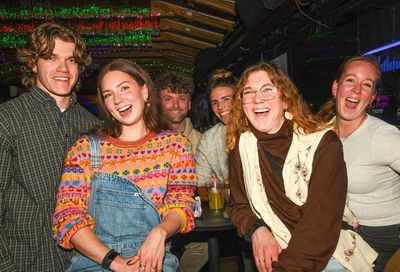WNO’s ‘La bohème’ Review: The Crying Game
Swooningly melodic and accessible, the Washington National Opera's 'La bohème' is a reliable tear-jerker.

A tragic-cozy classic with something for everyone, Puccini’s La bohème (★★★★☆) is a notorious gateway drug. Many a lifelong addiction to the operatic hard stuff started with a night among La bohème’s star-crossed Parisian lovers. As well as being swooningly melodic and accessible, the music is enduringly complex and full of marvels. There is always something to savor or discover, even if you feel you know it like the back of your cold little hand.
And when it comes to emotional touchstones, this is a story that asks questions that (literally) never grow old: “What is it to fall madly in love when death is at hand?” and “Who would you run to in your last moments?” And, if you really like a gut punch: “How can one endure the truth that even the greatest love can’t cheat death?” When it comes to tear-jerkers, this one really has it all.
Of course, being wildly beloved, expectations are high and perhaps it’s this pressure that brings a somewhat tentative feel to the start of this season’s production (a revival of the one seen at WNO in 2014), despite the steady hand of conductor Alevtina Ioffe.
Choreographed fun isn’t easy to pull off at the best of times and here the opening-scene antics of Rodolfo and his friends in their artist’s garret feel a tad forced. Although Kang Wang’s interpretation of this Rodolfo is interestingly contemporary with his tendency toward introspective brooding, he never quite gels with the more traditional bluster of his friends Marcello (Gihoon Kim), Schaunard (Blake Denson) and visitor Colline (Peixin Chen).
If things are given a welcome bounce by the wonderful Peter Rose as landlord Benoit, it’s only a brief whiff of the kind of well-defined gusto these scenes need if they are to come alive.
This uneven energy continues after the gang heads out on the town, until Rodolfo’s neighbor Mimi arrives and, instantly captivated, he introduces himself with the famous, “Che gelida manina.” Wang achieves some stellar higher notes here, but there is not always quite enough power to be heard over the orchestra.
Indeed, it is soprano Gabriella Reyes’ Mimi who finally breaks the slightly stilted spell with her own introduction, a glorious rendering of “Mi chiamano Mimi.” She offers all the velvety, lilting warmth you could want and then soars spectacularly into the rafters. If there is such a thing as a collective sigh, it comes now: this is going to be good.
And, as if the entire production agrees, Act Two literally takes off with the young lovers joining Rodolfo’s friends at the Café Momus for some pre-Christmas revelry. Set designer Lee Savage delivers a charming post-WWI café and street scene, which — credit to choreographer Ben Wright — is literally a feast for the eyes with lively café-goers, dancers, buskers, and children filling the space with a riot of movement and song.
There are numerous moving parts and still a story to advance, and director Peter Kazaras skillfully embraces the melee while keeping an eye on the dramatic action. Just one of many clever moments is the way in which café staff and patrons spontaneously pair up to dance along with the drama and then melt away into the crowd as the mood changes.

The café also signals the arrival of the feisty Musetta, the femme fatale who has recently left Rodolfo’s friend Marcello for an older, wealthier man (delivered with much charisma again by Rose). Jacqueline Echols absolutely owns this role, exuding tremendous presence and singing this unstoppable woman with power and clarity in a rousing “Quando m’en vo.”
Echols is an especially strong actor and her move from gadfly and unreliable girlfriend to the no-nonsense woman-who-knows-what-to-do in the final scene is highly effective. Less convincing is her bond with Marcello.
Although Gihoon Kim has a sense of this besotted youth and sings him with skill, there is no real chemistry with this Musetta, who seems more like a glamorous aunt to his college kid. Still, there are show-stopping moments, such as Act Three’s beautifully rendered quartet with Marcello and Musetta arguing while Rodolfo and Mimi reconcile. Echols truly shines in the seamless way she plays tempestuous, while vocally underpinning the crescendo of the lover’s heartache.
Unfortunately, the temperature also never quite rises enough between this Mimi and Rodolfo, despite Reyes’ consistently beautiful singing and delivery of Mimi’s angst. Although Wang gives a thoughtful performance with much detail, he writes it just a tad too small to connect with Mimi, who is herself intended as a quiet soul.
Without a more exciting bond, his later jealousy feels somewhat out of balance. And, as Mimi finally lies dying, there are moments when Rodolfo is so inwardly focused he almost turns into a bystander.
It is director Kazaras’ control of the finale with some carefully crafted movement and use of silence that sets the stage for Puccini’s devastating pathos — and pathos there is.
There is some music in this world that can transcend anything.
Thus, even with these few reservations, this is the moment to swoon in an imaginary Paris immersed in Puccini’s galaxy of timeless emotions. And if you know anyone even the slightest bit opera-curious, entice them along. Just don’t forget the hankies.
La bohème runs through May 27 in the Kennedy Center Opera House. A Pride Night is set for Friday, May 19. Tickets are $45 to $299. Call 202-467-4600 or visit www.kennedy-center.org/wno.
Support Metro Weekly’s Journalism
These are challenging times for news organizations. And yet it’s crucial we stay active and provide vital resources and information to both our local readers and the world. So won’t you please take a moment and consider supporting Metro Weekly with a membership? For as little as $5 a month, you can help ensure Metro Weekly magazine and MetroWeekly.com remain free, viable resources as we provide the best, most diverse, culturally-resonant LGBTQ coverage in both the D.C. region and around the world. Memberships come with exclusive perks and discounts, your own personal digital delivery of each week’s magazine (and an archive), access to our Member's Lounge when it launches this fall, and exclusive members-only items like Metro Weekly Membership Mugs and Tote Bags! Check out all our membership levels here and please join us today!

























You must be logged in to post a comment.